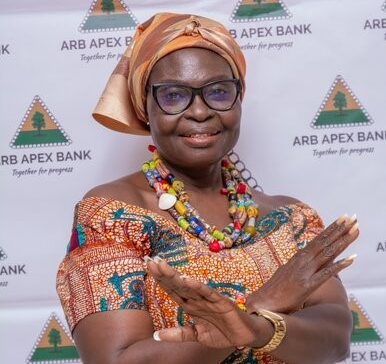Executive Director of the Association of Rural Banks-Ghana, Mrs. Comfort Owusu, has underscored the relevance of women in present-day global economic development, saying it is about time society gave equal opportunities to women and recognised their contributions in all aspects of development.
According to her, the world has evolved and the belief that women are incapable of doing what their male counterparts are noted for – particularly with regard to leadership responsibilities in the corporate environment – should no longer be endorsed.
Mrs. Owusu has however urged women to deliberately work their way to the top of the corporate ladder with all diligence and determination to ‘Break the Bias’.
Mrs. Comfort Owusu gave the advice as a guest speaker at a one-day symposium, put together by the ARB Apex Bank PLC to commemorate International Women’s Day on the global theme ‘Breaking the Bias’.
Mrs. Owusu took the female staff and other participants of the event at ARB Apex Bank through some known biases at the workplace, and professed some workable strategies to break them.
She first mentioned the perception that men are better at occupying corporate leadership positions than their female counterparts. In other words, women do not have what it takes to occupy corporate leadership positions. This bias, she said, is supported by the assertion that women are too emotional, do not show respect, and are dictatorial when they occupy a position of authority.
It is sad to mention that this bias has become an impediment preventing women from achieving elevated professional success by way of climbing atop the corporate
ladder – which has resulted in a gender gap for corporate leadership.
Mrs. Owusu mentioned, for example, that in the rural banking sector there are only eight women who are CEOs out of the one hundred and forty-five rural bank CEOs in Ghana, and this cuts across all sectors of the economy.
Related to this point is the bias that men are better political leaders than women. This has resulted in the under-representation of women. According to one reference, only 24% of parliamentary seats worldwide are held by women; and in Ghana there are only sixty female MPs out of the two hundred and seventy-five parliamentarians, constituting just 15%.
The most striking bias she mentioned was the perception by some men that women are merely sexual objects. This bias or mentality has, according to her, no doubt culminated in subjecting women to rape and sexual harassment in the workplace and other social settings – which has even led to child sexual abuse by some unscrupulous men.
The Association of Rural Banks’ Executive Director, in suggesting ways to break the challenges enumerated above, said women who currently occupy leadership positions should distinguish themselves through outstanding performance.
She stressed that women in sensitive positions at their workplaces should do well and achieve exceptional results, thus proving they are capable of delivering as required of them.
Again, women should work hard to earn the respect of their male superiors and general society through effective execution of their duties, particularly in the corporate environment.
Mrs. Owusu added that women must prepare themselves mentally to handle challenging tasks, and also deal with frustrations that will come their way in their quest to climb to the top of the corporate ladder.
She stressed that as women they must stand up to gender bias when it happens, and emphasised that government, policy-makers, law-making bodies, among others, also have a role to play in helping break the bias against women.
Mrs. Owusu finally suggested that HR professionals must review and fine-tune recruitment processes, by not focusing so much on gender but on competence, experience and integrity, among others.










